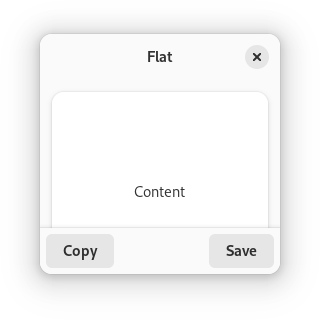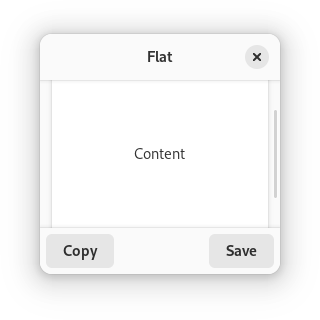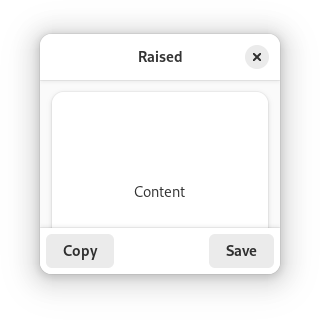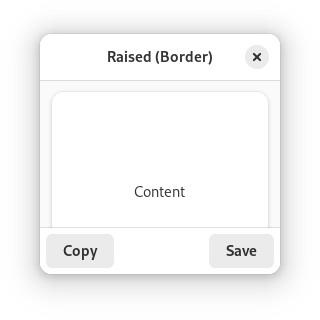Enum libadwaita::ToolbarStyle
source · #[non_exhaustive]pub enum ToolbarStyle {
Flat,
Raised,
RaisedBorder,
}v1_4 only.Expand description
Describes the possible top or bottom bar styles in an ToolbarView
widget.
ADW_TOOLBAR_FLAT is suitable for simple content, such as
StatusPage or PreferencesPage, where the background at the
top and bottom parts of the page is uniform. Additionally, windows with
sidebars should always use this style.


ADW_TOOLBAR_RAISED style is suitable for content such as
utility panes,
where some elements are directly adjacent to the top/bottom bars, or
TabView, where each page can have a different background.
ADW_TOOLBAR_RAISED_BORDER style is similar to ADW_TOOLBAR_RAISED, but
with the shadow replaced with a more subtle border. It’s intended to be used
in applications like image viewers, where a shadow over the content might be
undesired.


See top-bar-style and
bottom-bar-style.
New values may be added to this enumeration over time.
Variants (Non-exhaustive)§
This enum is marked as non-exhaustive
Flat
No background, shadow only for scrolled content
Raised
Opaque background with a persistent shadow
RaisedBorder
Opaque background with a persistent border
Trait Implementations§
source§impl Clone for ToolbarStyle
impl Clone for ToolbarStyle
source§fn clone(&self) -> ToolbarStyle
fn clone(&self) -> ToolbarStyle
1.0.0 · source§fn clone_from(&mut self, source: &Self)
fn clone_from(&mut self, source: &Self)
source. Read moresource§impl Debug for ToolbarStyle
impl Debug for ToolbarStyle
source§impl From<ToolbarStyle> for Value
impl From<ToolbarStyle> for Value
source§fn from(v: ToolbarStyle) -> Self
fn from(v: ToolbarStyle) -> Self
source§impl<'a> FromValue<'a> for ToolbarStyle
impl<'a> FromValue<'a> for ToolbarStyle
§type Checker = GenericValueTypeChecker<ToolbarStyle>
type Checker = GenericValueTypeChecker<ToolbarStyle>
source§unsafe fn from_value(value: &'a Value) -> Self
unsafe fn from_value(value: &'a Value) -> Self
Value. Read moresource§impl HasParamSpec for ToolbarStyle
impl HasParamSpec for ToolbarStyle
type ParamSpec = ParamSpecEnum
§type SetValue = ToolbarStyle
type SetValue = ToolbarStyle
type BuilderFn = fn(_: &str, _: ToolbarStyle) -> ParamSpecEnumBuilder<'_, ToolbarStyle>
fn param_spec_builder() -> Self::BuilderFn
source§impl Hash for ToolbarStyle
impl Hash for ToolbarStyle
source§impl Ord for ToolbarStyle
impl Ord for ToolbarStyle
source§fn cmp(&self, other: &ToolbarStyle) -> Ordering
fn cmp(&self, other: &ToolbarStyle) -> Ordering
1.21.0 · source§fn max(self, other: Self) -> Selfwhere
Self: Sized,
fn max(self, other: Self) -> Selfwhere
Self: Sized,
source§impl PartialEq for ToolbarStyle
impl PartialEq for ToolbarStyle
source§fn eq(&self, other: &ToolbarStyle) -> bool
fn eq(&self, other: &ToolbarStyle) -> bool
self and other values to be equal, and is used
by ==.source§impl PartialOrd for ToolbarStyle
impl PartialOrd for ToolbarStyle
source§fn partial_cmp(&self, other: &ToolbarStyle) -> Option<Ordering>
fn partial_cmp(&self, other: &ToolbarStyle) -> Option<Ordering>
1.0.0 · source§fn le(&self, other: &Rhs) -> bool
fn le(&self, other: &Rhs) -> bool
self and other) and is used by the <=
operator. Read moresource§impl StaticType for ToolbarStyle
impl StaticType for ToolbarStyle
source§fn static_type() -> Type
fn static_type() -> Type
Self.source§impl ToValue for ToolbarStyle
impl ToValue for ToolbarStyle
source§impl ValueType for ToolbarStyle
impl ValueType for ToolbarStyle
§type Type = ToolbarStyle
type Type = ToolbarStyle
Type from. Read moreimpl Copy for ToolbarStyle
impl Eq for ToolbarStyle
impl StructuralPartialEq for ToolbarStyle
Auto Trait Implementations§
impl RefUnwindSafe for ToolbarStyle
impl Send for ToolbarStyle
impl Sync for ToolbarStyle
impl Unpin for ToolbarStyle
impl UnwindSafe for ToolbarStyle
Blanket Implementations§
source§impl<T> BorrowMut<T> for Twhere
T: ?Sized,
impl<T> BorrowMut<T> for Twhere
T: ?Sized,
source§fn borrow_mut(&mut self) -> &mut T
fn borrow_mut(&mut self) -> &mut T
source§impl<T> IntoClosureReturnValue for T
impl<T> IntoClosureReturnValue for T
fn into_closure_return_value(self) -> Option<Value>
source§impl<T> PropertyGet for Twhere
T: HasParamSpec,
impl<T> PropertyGet for Twhere
T: HasParamSpec,
source§impl<T> StaticTypeExt for Twhere
T: StaticType,
impl<T> StaticTypeExt for Twhere
T: StaticType,
source§fn ensure_type()
fn ensure_type()
source§impl<T> ToSendValue for T
impl<T> ToSendValue for T
source§fn to_send_value(&self) -> SendValue
fn to_send_value(&self) -> SendValue
SendValue clone of self.